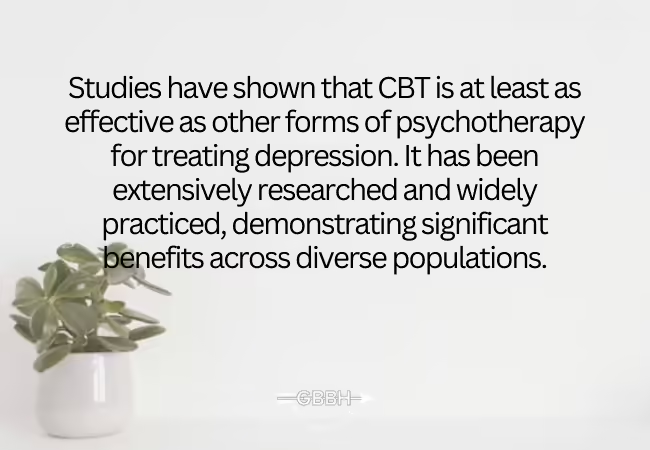Our thoughts influence how we feel, behave, and interact with the world around us. While rational thinking helps us navigate challenges and maintain balance, distorted thinking patterns—known as cognitive distortions—can lead to emotional distress and unhealthy behaviors. These automatic and often irrational thought processes are a significant focus in mental health treatment, as they play a crucial role in conditions like anxiety, depression, and stress-related disorders.
Cognitive Behavioral Therapy, a leading evidence-based treatment, is designed to address these distorted patterns by promoting healthier, more balanced thinking. At Greater Boston Behavioral Health, we incorporate CBT into our comprehensive Mental Health Therapy Programs, empowering clients to reshape their thoughts, improve emotional well-being, and achieve long-term recovery.
What Are Cognitive Distortions?
Cognitive distortions are patterns of inaccurate or irrational thinking that negatively affect our emotions and behaviors. These distortions often arise automatically, without conscious awareness, and can significantly influence how we perceive situations and ourselves.
Common Types of Cognitive Distortions
- All-or-Nothing Thinking (Black-and-White Thinking):
- Viewing situations in extremes, without recognizing the middle ground.
- Example: “If I don’t do this perfectly, I’m a total failure.”
- Overgeneralization:
- Making sweeping conclusions based on a single event.
- Example: “I didn’t get the job. I’ll never be successful in anything.”
- Catastrophizing:
- Expecting the worst possible outcome in any situation.
- Example: “If I make one mistake, everything will fall apart.”
- Mind Reading:
- Assuming you know what others are thinking, often negatively.
- Example: “They didn’t say hello to me, so they must dislike me.”
- Disqualifying the Positive:
- Ignoring or dismissing positive experiences and focusing solely on negatives.
- Example: “That compliment doesn’t count; they were just being polite.”
- Should Statements:
- Creating unrealistic expectations for yourself or others using “should” or “must.”
- Example: “I should always be productive; if I’m not, I’m lazy.”
These distorted thought patterns can lead to chronic stress, anxiety, and depression, making it difficult to maintain emotional balance and achieve personal goals.
The Negative Impact of Cognitive Distortions
Cognitive distortions, or habitual patterns of inaccurate thinking, can profoundly affect mental health and daily life. These negative thought patterns distort reality, leading to heightened emotional distress and unhealthy behaviors.
Emotional Consequences
- Increased Anxiety: Distortions like catastrophizing can amplify fears and make minor challenges feel insurmountable.
- Heightened Depression: Negative self-talk, such as disqualifying the positive, fosters feelings of hopelessness and low self-esteem.
- Chronic Stress: Constantly engaging in distorted thinking can put the brain and body under prolonged stress, impacting overall well-being.
Impact on Relationships
- Conflict and Misunderstanding: Mind reading and overgeneralization can lead to false assumptions about others’ intentions, straining relationships.
- Isolation: Individuals may withdraw due to feelings of inadequacy or fear of judgment perpetuated by distorted thinking.
Professional and Personal Challenges
- Workplace Difficulties: All-or-nothing thinking can create unrealistic standards, leading to burnout or feelings of failure.
- Decision Paralysis: Cognitive distortions often cause individuals to second-guess themselves, delaying important decisions or actions.
Overview of Cognitive Behavioral Therapy
Cognitive Behavioral Therapy (CBT) is a highly effective, evidence-based therapeutic approach that focuses on identifying, challenging, and altering negative thought patterns and behaviors. It is grounded in the understanding that thoughts, feelings, and behaviors are interconnected.
Core Principles of CBT
- Thought Awareness: Helping individuals recognize automatic, negative thought patterns.
- Thought Challenging: Teaching clients to critically evaluate and question the validity of these thoughts.
- Behavioral Change: Encouraging healthier, goal-oriented behaviors to replace unproductive or harmful actions.
CBT in Practice
CBT sessions typically include structured exercises, such as:
- Journaling: Tracking thoughts and identifying distortions in a thought record.
- Role-Playing: Practicing healthier responses to challenging situations.
- Homework Assignments: Applying CBT techniques between sessions to reinforce learning.
Benefits of CBT for Mental Health
CBT offers numerous benefits, making it one of the most widely recommended therapies for mental health conditions:
1. Versatility Across Conditions
CBT effectively treats a wide range of mental health issues, including:
- Anxiety disorders
- Depression
- Post-traumatic stress disorder (PTSD)
- Obsessive-compulsive disorder (OCD)
- Eating disorders
2. Short-Term and Goal-Oriented
Unlike some therapies, CBT is typically structured to achieve measurable outcomes within a shorter time frame, providing quick relief for many clients.
3. Empowering Self-Sufficiency
CBT equips individuals with practical tools to manage their thoughts and emotions, fostering long-term resilience and self-reliance.
4. Evidence-Based Effectiveness
Studies show that CBT significantly reduces symptoms of anxiety and depression, with long-lasting improvements when combined with other approaches like DBT Therapy or medication.
5. Improved Interpersonal Relationships
By addressing distorted thinking patterns, CBT enhances communication, emotional regulation, and problem-solving skills, leading to healthier relationships.
Tips for Managing Cognitive Distortions on Your Own
While professional therapy like CBT is highly effective, there are steps you can take on your own to begin addressing cognitive distortions:
1. Keep a Thought Journal
- Write down troubling thoughts as they arise, and note the emotions associated with them.
- Identify any patterns or recurring distortions, such as catastrophizing or all-or-nothing thinking.
2. Challenge Negative Thoughts
- Ask yourself questions like:
- “What evidence supports this thought?”
- “Is there an alternative explanation?”
- “Am I viewing this situation objectively?”
- Replace distortions with more balanced and constructive thoughts.
3. Practice Mindfulness
- Focus on staying present and observing your thoughts without judgment.
- Use mindfulness meditation to develop greater self-awareness and reduce overthinking.
4. Set Realistic Goals
- Break down overwhelming tasks into smaller, manageable steps.
- Celebrate progress, even if it feels small, to reinforce positive thinking patterns.
5. Engage in Positive Activities
- Plan activities that bring joy or relaxation, such as exercising, reading, or spending time with loved ones.
- These actions can shift focus away from negative thoughts and boost overall mood.
6. Seek Social Support
- Share your concerns with trusted friends or family members.
- Hearing different perspectives can help challenge distorted thinking and provide emotional validation.
How Cognitive Behavioral Therapy (CBT) Helps
Cognitive Behavioral Therapy is a structured, goal-oriented form of psychotherapy that focuses on identifying, challenging, and modifying cognitive distortions. By addressing these negative thought patterns, CBT helps individuals develop healthier ways of thinking, feeling, and behaving.
1. Identifying Cognitive Distortions
CBT begins with helping clients become aware of their automatic thought patterns. This process involves:
- Keeping thought records or journals to track situations and the corresponding thoughts and feelings.
- Recognizing recurring patterns that lead to emotional distress.
2. Challenging Negative Thought Patterns
Once distortions are identified, therapists guide clients through techniques to question and challenge them:
- Reality Testing: Evaluating the evidence for and against a thought.
Example: “What proof do I have that I’ll never succeed? Are there examples of times I’ve succeeded before?” - Reframing: Shifting from a negative interpretation to a more balanced perspective.
Example: “Instead of saying, ‘I failed completely,’ think, ‘This was a setback, but I can learn from it.’”
3. Replacing Distortions with Constructive Thoughts
CBT emphasizes replacing irrational thoughts with rational, constructive alternatives. For example:
- Cognitive distortion: “I’ll never be good enough.”
- Balanced thought: “I have areas for improvement, but I’m capable and learning every day.”
4. Practical Tools and Strategies
CBT provides clients with actionable strategies to reinforce healthier thinking, such as:
- Behavioral Activation: Encouraging positive activities that improve mood and reduce avoidance.
- Problem-Solving Techniques: Teaching clients to approach challenges systematically rather than emotionally.
- Mindfulness Practices: Helping individuals stay present and reduce overthinking.
Through these tools, clients gain confidence in managing their thoughts and emotions, fostering resilience and improved mental health.
The Role of Behavioral Health in Boston
At Greater Boston Behavioral Health, our Mental Health Treatment Programs are designed to address cognitive distortions comprehensively. We combine CBT Therapy with DBT Therapy, providing a holistic approach that enhances emotional regulation and interpersonal skills. Our clients benefit from:
- Personalized Care Plans: Tailored to address individual needs, ensuring the most effective outcomes.
- Expert Therapists: Trained in evidence-based therapies, offering compassionate and professional guidance.
- Comprehensive Support: A safe and nurturing environment at our Mental Health Treatment Center in Boston, empowering clients to achieve sustainable growth.
The Impact of Cognitive Distortions
Left unaddressed, cognitive distortions can perpetuate cycles of negativity, leading to:
- Increased symptoms of anxiety and depression.
- Struggles in personal and professional relationships.
- Reduced self-esteem and a diminished sense of self-worth.
By addressing these distortions through CBT, individuals can break free from these cycles, improving their emotional health and overall quality of life.
Overcoming Barriers to CBT
Some individuals may feel hesitant about starting therapy due to misconceptions about CBT or mental health treatment in general. At Greater Boston Behavioral Health, we strive to make therapy accessible and approachable by:
- Educating clients on the benefits of CBT and how it works.
- Offering a welcoming and judgment-free environment.
- Providing integrated care that includes medication management and additional therapies if needed.
Conclusion
Cognitive distortions can hold you back, but they don’t have to define your reality. With the help of Cognitive Behavioral Therapy (CBT), you can identify and challenge negative thought patterns, paving the way for healthier emotions and behaviors.
At Greater Boston Behavioral Health, we’re here to support you on your journey to recovery. Our experienced team offers compassionate, evidence-based care designed to help you thrive. Call us at (888)278-0716 today to learn more about our services and how we can help you on your journey to recovery!
FAQ on Cognitive Distortions
How do cognitive distortions affect mental health?
These distortions can increase feelings of anxiety, depression, and stress, negatively impacting relationships, decision-making, and overall quality of life.
How does CBT work for cognitive distortions?
CBT involves structured techniques like journaling, reality testing, and thought reframing to help clients understand and modify distorted thought patterns.
What are the benefits of CBT for mental health?
CBT is effective for treating anxiety, depression, PTSD, OCD, and more. It equips individuals with practical tools to manage their emotions and fosters long-term resilience.
Can I manage cognitive distortions on my own?
Yes, strategies like journaling, mindfulness, and challenging negative thoughts can help. However, professional guidance through therapy often yields better results.
How long does it take for CBT to work?
CBT is typically a short-term therapy, with many clients experiencing significant improvements within 12-20 sessions, depending on individual needs.
Is CBT effective when combined with other therapies?
Yes, combining CBT with therapies like DBT (Dialectical Behavior Therapy) or medication management enhances treatment outcomes for many individuals.
Who can benefit from CBT at Greater Boston Behavioral Health?
Anyone experiencing anxiety, depression, or negative thought patterns can benefit from CBT. Our tailored programs address a wide range of mental health challenges.
How can I start CBT for cognitive distortions?
Contact Greater Boston Behavioral Health to schedule an assessment and learn how our Mental Health Treatment Programs can support your journey to better mental health.


